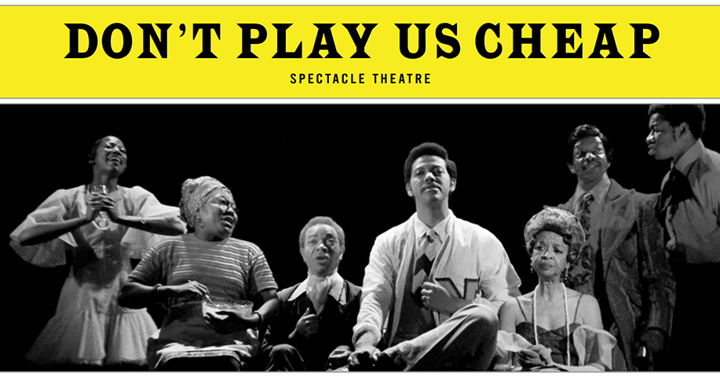DON'T PLAY US CHEAP

DON’T PLAY US CHEAP
Dir. Melvin van Peebles, 1973
United States. 102 min.
In English.
FRIDAY, JUNE 6 – 7:30 PM
SATURDAY, JUNE 14 – 10 PM
THURSDAY, JUNE 19 – 7:30 PM
FRIDAY, JUNE 27 – 10 PM
Trinity (Joe Keyes Jr.) and Brother Dave (Avon Long) are a pair of devilish imps looking for a party to break up. They come across one in Harlem being thrown by Miss Maybell (Esther Rolle) in honor of her niece Earnestine’s (Rhetta Hughes) birthday. Assuming human form, they infiltrate the party and attempt to wreak havoc by drinking all the alcohol, eating all the food, and insulting the guests, only for their efforts to be met with good-natured dismissal. As Trinity begins to fall in love with Earnestine, his and Dave’s mission to break up the party turns into a race against the clock, lest midnight strike when they’ll both be turned into the thing they’ve only pretended to be: human.
Written, composed, directed, and produced by Melvin van Peebles, DON’T PLAY US CHEAP took a rather unusual path towards becoming the stuff of Broadway legend. Van Peebles originally mounted the production, a musical adaptation of his 1967 French-language novel La fête à Harlem, in San Francisco in 1970 with no real intention of a Broadway run. Instead, following the unexpected success of his independently-financed 1971 feature, SWEET SWEETBACK’S BAADASSSSS SONG, van Peebles opted to adapt the musical for his next film project. Filming was completed in early 1972 however, unable to find a distributor, van Peebles decided to bring the production to Broadway anyway, debuting at the Ethel Barrymore Theatre in May of that year as the “lighter” half of a stage musical diptych that also featured van Peeble’s much darker-themed AIN’T SUPPOSED TO DIE A NATURAL DEATH, which opened on the same stage just a few months later.
Van Peebles’ film— shot before the Broadway production was even conceived but released after it had already closed— received a short theatrical run in 1973 before finding new life on home video decades later. Since its revival, the work has been lauded by theater and film audiences alike for van Peebles’ unique staging of the musical numbers, often featuring solo performers backed by the full cast in arrangements that underscore their communal nature, and for its richly allegorical book and script, the subjects of which have been interpreted as metaphors for everything from the FBI’s attempts to dismantle the Black Panther Party, to free love, to class conflict, to above all, black resiliency, joy, and determination in the face of contemporary adversity.

